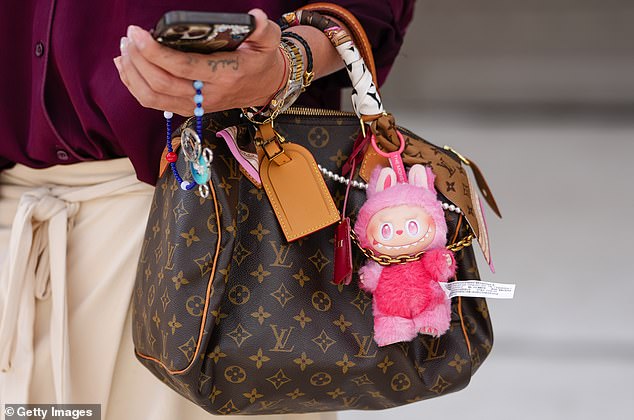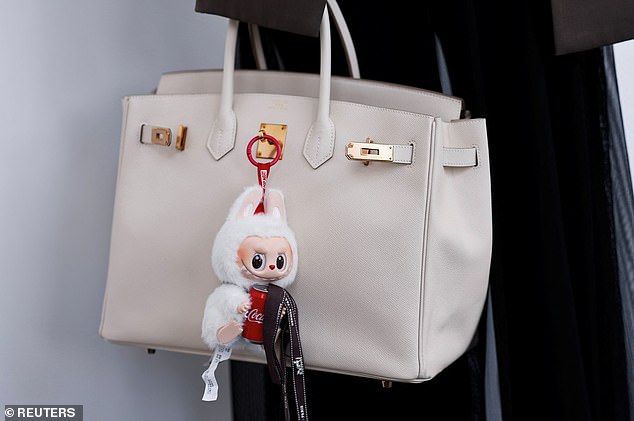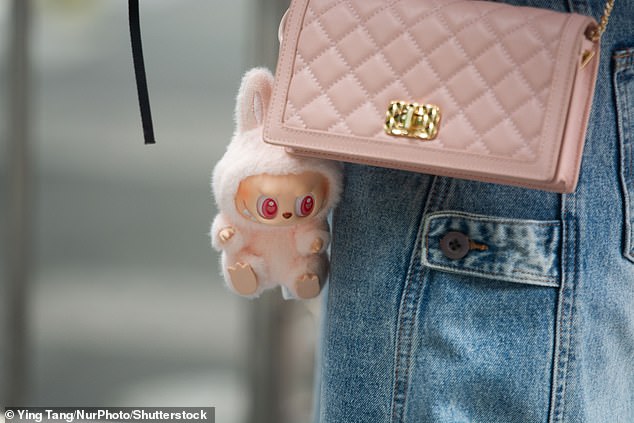Singletons who collect Labubus could be putting off potential dates, according to a relationship expert.
The sharp-toothed grinning toys, which have sparked a craze among Gen Z consumers, were inspired by the illustrated book series The Monsters, created by Hong Kong artist Kasing Lung, in which Labubus are a tribe of female elves.
They became the must-have item for thousands of young adults and teens after Lung partnered with Chinese toy company POP MART in 2019, producing toys based on his creations.
And some people have reportedly spent thousands on the collectibles, with others queuing for hours in order to try and get their hands on a new Labubu.
But singletons who collect the items could could see their dating pool shrink, as some people – particularly men – are reportedly put off by the trinkets.
Relationship expert Dr Mindy DeSeta, of the Hily Dating app, told Vice there could be a number of reasons why – from seeing the figures as ‘immature’ to questioning the money management of those who collect them.
Speaking about the issue of the maturity, she told the outlet that Labubus ‘are often misunderstood and quickly labeled as “dolls”.’
This, she continued, can make people subconsciously question the ‘maturity and life priorities’ of people who collect them.

DEDICATED FOLLOWER OF FASHION: An attendee of Paris Fashion Week in July 2025 is snapped carrying a Louis Vuitton bag adorned with a Labubu
Dr DeSeta added that when dating, first impressions are ‘powerful’, and accessories like Labubus can send signals about who a person is, whether they intend to send those signals or not.
Men in particular are likely to be put off by Labubus, she noted, even if subconsciously so, therefore ‘anything that hints at immaturity can become a subtle red flag’.
Another judgement daters may make about those who collects the items is that they are easily influenced, according to the expert.
As Labubus have become a ‘viral craze’ due to TikTok and celebrity endorsement, a date may ‘wonder if you make choices based on trends rather than your own values’, Dr DeSeta said.
This could subsequently lead them to question the Labubu fan’s authenticity, prompting them to wonder whether someone who collects the dolls will ‘jump on every bandwagon that comes along’.
Moving onto another point, Dr DeSeta noted the cost of Labubus – which can spiral into the hundreds if not thousands, as they can be highly collectible.
Because they sell out so quickly, people will often resell them for inflated prices, with some fans even paying to just rent a Labubu.
As financial habits are a big deal when dating – even in the early stages – the expert said that spending significant amounts of money on the collectable keychains could suggest that a person might be ‘financially impulsive or irresponsible’.

Daters may be judgemental about those who collect Labubus, according to a relationship expert
If a dater is prudent when it comes to budgeting, and they question whether a Labubu collector is wise when it comes to money management, this could put them off pursuing the relationship further.
Another issue raised by the expert is that while collecting the items is often a ‘sweet, quirky passion’, it could come across as ‘a sign of superficiality’.
‘Many collectors love flaunting their rare finds and pairing them with designer outfits to show off their Labubus,’ Dr DeSeta said, adding that while this can be ‘fun’, it may come off as ‘superficial’ or ‘high maintenance’ to some.
This could then result in a date questioning whether the Labubu lover is ‘relationship material or just someone who needs to be constantly impressed’, she added.
Her final point was that those who collects the keychains are likely to invest both time and energy into getting their hands on the sought-after items.
Because restocks can sell out within minutes – or even seconds – securing one means buyers have to be organised and strategic, organising their schedule that day around the time and location of the restock.
Dr DeSeta said that if ‘your date finds out you spent hours waiting in line or obsessively refreshing websites for a blind box, they might be put off’.
In addition, she noted, if someone dedicates such significant amounts of effort to following a trend, this could ‘raise questions about your priorities and emotional availability’.

As buying Labubus requires significant investment in terms of time and energy, this could prompt a date to question the ‘priorities and emotional availability’ of a collector, according to an expert

Chartered clinical psychologist Tracy King, who has been tracking the rise of ‘trinket culture’ among younger generations warned that owning Labubus could be a sign of deeper emotional struggles
It comes after a psychologist warned that owning Labubus could be a sign of deeper emotional struggles. While the trend may seem harmless, it has raised eyebrows among mental health professionals – particularly as some fans admit to spending hundreds, even thousands, on the items.
From unboxing videos to elaborate displays, fans of the quirky creatures say they’re a cute collectable item, but experts say there might be more going on under the surface.
Chartered clinical psychologist Tracy King, who has been tracking the rise of ‘trinket culture’ among younger generations claims it is a ‘response to burnout and disconnection.’
King described the Labubu toy craze not as a ‘shallow trend’, but as a ‘psychological response’ to the unpredictable climate Gen Z are growing up in. Speaking to Tyla, she explained: ‘On the surface, they’re fun and whimsical. But psychologically, they’re deeply symbolic: these objects offer small, accessible moments of comfort, control, and identity in an unpredictable world.’
She claimed Gen Z don’t have the same financial security as past generations with home ownership on the decline – leaving many young people feeling out of control. However, collectibles are ‘something you can control’.
The psychologist went on to explain how, while previous generations were largely saving for mortgages and pensions, Gen Z are instead ‘investing in now’.
Dr King said: ‘They’ve watched global crises unravel with pandemics, recessions, the climate emergency – so the big life goals that guided previous generations often feel out of reach.
She clarified that they are not collecting the toys ‘out of immaturity’ but instead as a ‘form of emotional repair’, adding: ‘These soft, playful objects evoke feelings of safety, care, and nostalgia, things that might’ve been missing or cut short in early life. This is inner child work in action.’











